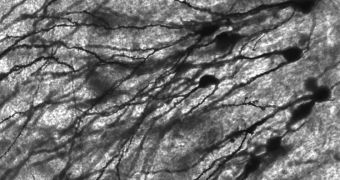According to the conclusions of a new study conducted on unsuspecting lab mice, it would appear that the timing of when the neurotransmitter acetylcholine is released in the brain is critical for understanding diseases such as Alzheimer’s and schizophrenia.
This chemical is usually released in the hippocampus, which is an area of the human brain that controls the formation of new memories and plays an important role in spatial navigation. The study indicates that the patterns in which the neurotransmitter is produced dictate synaptic health.
Synapses are the connections that form between neurons. They are, in fact, hollow spaces that separate the ends of two neural axons. Vast numbers of chemicals called neurotransmitters fill this space, shuttling from one axon to another, thus allowing individual nerve cells to communicate.
The inner workings of neuron signaling are still superficially understood even to this day, and experts believe that clearing up this mystery could hold the key towards addressing many disorders, as well as improving processes such as learning and memory formation.
What neuroscientists are particularly interested in is identifying the mechanisms that lead to memory formation, as well as the conditions under which these mechanisms go astray. When the latter happens, dementia and/or schizophrenia may ensue.
The new investigation was carried out by experts at the National Institute of Environmental Health Sciences (NIEHS), who say that they were able to identify a mechanism that synchronizes changes in the strength of neural connections.
“We’ve demonstrated that when we stimulate the release of acetylcholine at just the right time in the hippocampus, we can induce a cellular change at synapses that use [the neurotransmitter] glutamate,” Jerrel Yakel, PhD, explains.
The expert, a senior investigator in the NIEHS Laboratory of Neurobiology, is also the coauthor of a new paper detailing the findings. The work is published in the latest online issue of the esteemed medical journal Neuron, PsychCentral reports.
“A change of even a few hundredths of a second in the timing of acetylcholine release can make a difference. No one had shown this was important until now,” adds study coauthro Zhenglin Gu, PhD.
The new work could benefit researchers analyzing a wide variety of conditions in which the acetylcholine system and hippocampus are critical components. In a few short years, these discoveries may be put to good use, in new therapies and treatments aimed against these conditions.

 14 DAY TRIAL //
14 DAY TRIAL //